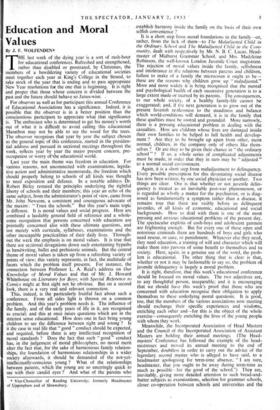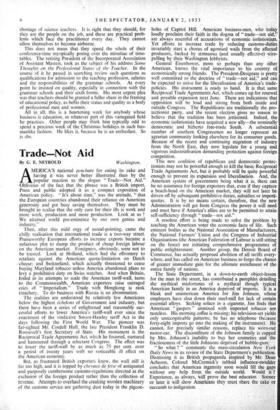Education and Moral Values
By J. F. WOLFENDEN* THE last week of the dying year is a sort of rush-hour for educational conferences. Refreshed and strengthened, rather than disabled or prostrated, by Christmas, the members of a bewildering variety of educational societies meet together each year at King's College in the Strand, to take stock of the year that is ending and to pass appropriate New Year resolutions for the one that is beginning. It is right and proper that those whose concern is divided between the past and the future should behave so Janus-wise. , For observer as well as for participant this annual Conference of Educational Associations has a significance. Indeed, it is possible that the observer is in a better position than the conscientious participant to appreciate what that significance is. The enthusiast who is determined to get his money's worth out of what it is difficult to avoid calling this educational Marathon may not be able to see the wood for the trees. The observer recognises that year by year the subject chosen as the general topic of this conference, started in the presiden- tial address and pursued in sectional meetings throughout the week, reflects year by year the major present concern, pre- occupation or worry of-the educational world.
Last year the main theme was freedom in education. For various reasons, not unconnected with examinations, legisla- tive action and administrative memoranda, the freedom which should properly belong to schools of all kinds was thought to need exposition and defence. In a notable address Dr. Robert Birley restated the principles underlying the rightful liberty of schools and their members; this year an echo of the same subject, from the administrator's point of view, came from Mr. -John Newsom, a consistent and courageous advocate of the maxim : " Trust the schools." But this year's main topic is different. It is moral values and social progress. Here are combined a laudably general field of reference and a whole- some recognition that persons concerned with education are pointedly concerned also with these ultimate questions, and not merely with curricula, syllabuses, examinations and the other inescapable practicalities of their daily lives. Through- but the week the emphasis is on moral values. It is true that there are sectional divagations down such entertaining bypaths as handwriting, ballet and prehistoric animals. But the central theme of moral values is taken up from a refreshing variety of points of view; this variety represents, in fact, the multitude of facets which the problem itself presents. For instance, the connection between Professor L. A. Reid's address on Our Knowledge of Moral Values and that of Mr. J. Howard Whitehouse on Literature for Boys, with Special Reference to Comics might at first sight not be obvious. But on a second look, there is a very real and relevant connection. This, indeed, is the particularly fruitful fact about such a conference. From all sides light is thrown on a common problem. And this year's problem needs it. The influence of the family, and of the early years of life in it, are recognised as crucial; and this at once raises questions which are in the strictest sense educational. How does one in fact bring young children to see the difference between right and wrong ? Is it the case in real life that "good "conduct should be expected, and required, before there is any intellectual recognition of moral standards ? Does the fact that such " good " conduct has, in the judgement of moral philoaaphers, no moral merit alter the fact that, for the sake of harmonious family relation- ships, the foundation of harmonious relationships in a wider society afterwards, it should be demanded of the not-yet- intellectually-conscious young ? What of the relationships between parents, which the young are so unerringly quick to see with their candid eyes ? And what of the parents who
* Vice-Chancellor of Reading University; formerly Headmaster of Uppingham and of Shrewsbury.
-establish hargiony inside the family on the basis of their own selfish convenience ? - It is a short step from moral foundations in the family—or, rather, from the lack of them—to The Maladjusted Child in the Ordinary School and The Maladjusted Child in the Com- munity, dealt with respectively by Mr. N. B. C. Lucas, Head- master of Midhurst Grammar School, and Mrs. Madeleine Robinson, the well-known London Juvenile Court magistrate. The rejection of moral values inside the family, selfishness and intolerance in the relations between parents and children, failure to make of a family the microcosm it ought to be— these are the reasons why children grow up "maladjusted." More and more widely it is being recognised that the mental and psychological health of each successive generation is to a large extent made or marred by its parents. The consequences, to our whole society, of a healthy family-life cannot be exaggerated; and, if tile next generation is to grow out of the present feverish restlessness to the steadiness and balance which world-conditions will demand, it is in the family that these qualities must be rooted and grounded. More narrowly, there is a pressing educational problem in dealing with the casualties. .How are children whose lives are damaged inside their own families to be helped to full health and develop- ment? Are they to be brought up apart from other, more normal, children, in the company only of others like them- selves ? Or are they to be given their chance in "the ordinary school " ? If so, a whole series of complicated adjustments must be made, in order that they in turn may be " adjusted " to a normal social environment.
Again, it is a short step from maladjustment to delinquency. Every possible prescription for this devastating social disease has now been written, by one social physician or another. Two things are clear. One is that whether or not juvenile delin- quency is treated as an inevitable post-war phenomenon, or is regarded as wholly a matter for the psychiatrist, or is diag- nosed as fundamentally a symptom rather than a disease, it remains true that there are visibly before us delinquent juveniles, of all kinds of economic, educational and social backgrounds. How to deal with them is one of the most pressing and anxious educational problems of the present day. The spectacular exploits of cosh-boys and adolescent gunmen are frightening enough. But for every one of these open and notorious criminals there are hundreds of boys and girls who need rescue, or cure, or punishment. Whatever else they need, they need education, a training of will and character which will make them into persons of some benefit to themselves and to society. Here, again, in a genuine use of the word, the prob- lem is educational. The other thing that is clear is that, whether or not it may be fashionable to say so, the problem oi juvenile delinquency is largely a moral problem.
It is right, therefore, that this week's educational conference should be focused on moral values. The two adjectives are, to any thoughtful person, inseparable; and it is encouraging that we should have this week's proof that those who are concerned with education recognise their obligation to apply themselves to these underlying moral questions. It is good, too, that the members of the various associations now meeting should exchange their specific experiences and wisdoms, enriching each other and—for this is the object of the whole exercise—consequently enriching the lives of the young people with whom they work. - Meanwhile, the Incorporated Association of Head Masters and the Council of the Incorporated Association of Assistant Masters are holding their annual meetings. (The Head- masters' Conference has followed the example of the head- mistresses and moved its annual meeting to the end of September, doubtless in order to carry out the advice of the legendary second master who , is alleged to have said, to a headmaster apologising for term-time absence, "I am sure, headmaster, that you ought to .be away during term-time as much as possible—for the good of the school.") They are, inevitably, giving more detailed attention to such bread-and- butter subjects as examinations, selection for grammar schools, closer co-operation between schools and universities and the shortage of science teachers. It is right that they should, for they are the people on the job, and these are practical prob- lems which face the practitioner every day. They cannot allow themselves to become airborne.
This does not mean that they spend the whole of their conference-time myopically poring over the minutiae of time- tables. The retiring President of the Incorporated Association of Assistant Masters, took as the subject of his address Some Thoughts on the Professional Status of the Teacher. In the course of it he passed in searching review such questions as qualifications for admission to the teaching profession, salaries and the responsibilities of the grammar schools. At every point he insisted on quality, especially in connection with the grammar schools and their sixth forms. His most urgent plea was that teachers should be granted a fuller share in the framing of educational policy, as befits their status and quality as a body of professional men and women.
All in all, this is a heartening week for anybody whose business is education, in whatever part of this variegated field he practises. Other people may think him typically odd to spend a precious week of the Christmas holidays in such bus- manlike fashion. He likes it, because he is an enthusiast. So is she.































 Previous page
Previous page